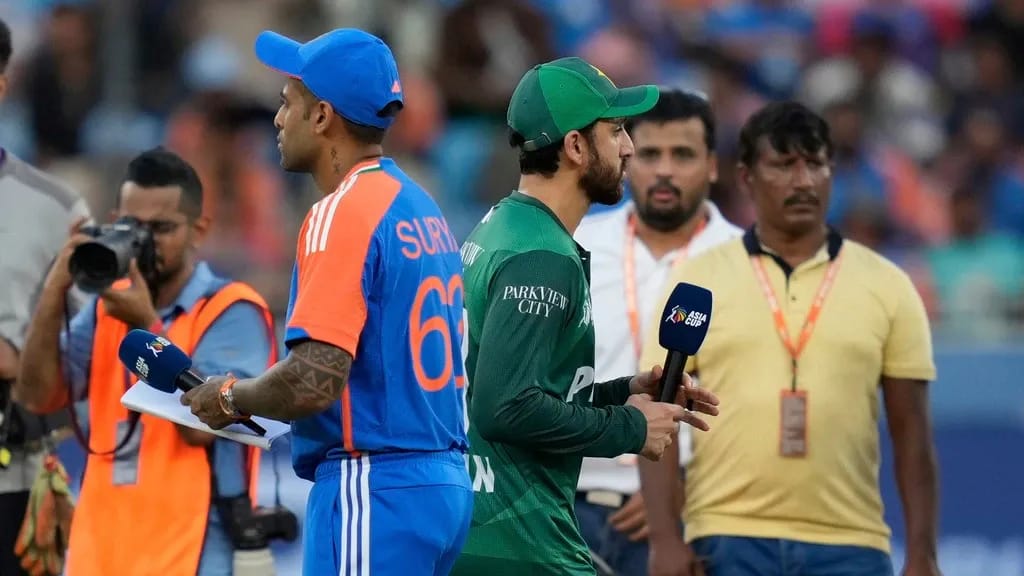Michael Atherton Slams ICC Over India-Pakistan Matches: "Cricket Now Proxy for Propaganda"

Michael Atherton Criticizes ICC: India vs Pakistan Cricket Matches Now "Proxy for Propaganda"
Former England captain Michael Atherton has launched a scathing attack on the International Cricket Council, urging them to stop deliberately scheduling India-Pakistan matches in tournaments. Writing in The Times, Atherton argued that cricket's greatest rivalry has transformed from a vehicle for diplomacy into a tool for political posturing and propaganda, particularly after the controversy-marred Asia Cup 2025.
From Diplomacy to Propaganda
Atherton didn't mince words when describing how the India-Pakistan cricket relationship has deteriorated in recent years.
"If cricket was once the vehicle for diplomacy, it is now, clearly, a proxy for broader tensions and for propaganda. There is little justification, in any case, for a serious sport to arrange tournament fixtures to suit its economic needs, and now that the rivalry is being exploited in other ways, there is even less justification for it."
The Asia Cup 2025 provided stark evidence of this shift. All three India-Pakistan encounters were overshadowed by off-field controversies: handshake snubs, provocative gestures by players, and the infamous trophy presentation fiasco where India refused to accept the Asia Cup from Pakistan Cricket Board chairman Mohsin Naqvi, who then retained the trophy rather than finding an alternative presenter.
The Economic Reality
Despite his criticism, Atherton acknowledged the massive financial incentive driving these fixtures. India-Pakistan matches remain cricket's biggest commercial draw.
"Despite its scarcity (maybe, in part, because of its scarcity), it is a fixture that carries huge economic clout, one of the main reasons why the broadcast rights for ICC tournaments are worth so much — roughly $3 billion for the most recent rights cycle in 2023-27."
Since the last bilateral series in 2013, India and Pakistan only meet during multilateral tournaments like World Cups, Champions Trophy, and Asia Cup. This scarcity has only increased demand and commercial value, creating a situation where ICC events depend heavily on India-Pakistan clashes for their broadcasting appeal and sponsorship attraction.
The Transparent Draw Solution
Atherton's solution is straightforward: implement transparent tournament draws that don't guarantee India-Pakistan meetings every time.
"For the next broadcast rights cycle, the fixture draw before ICC events should be transparent, and if the two teams do not meet every time, so be it."
He argues that engineering groups and fixtures to ensure these high-stakes encounters compromises sporting integrity. While such matches boost viewership and revenue, deliberately arranging them transforms tournaments from genuine sporting competitions into commercial exercises where economics trump fair play.
BCCI Pushback
A BCCI official pushed back against Atherton's suggestion, highlighting the practical realities of modern cricket economics.
"It's easy to talk about all this, but will sponsors and broadcasters agree to it? In today's situation, if any major team, not just India, withdraws from a tournament, it will be difficult to attract sponsors."
This response underscores the fundamental tension Atherton identified: cricket is caught between maintaining sporting integrity and satisfying commercial imperatives that fund the game globally.
The Broader Context
Atherton's criticism reflects growing concerns about cricket's commercialization and the mixing of sport with geopolitical agendas. The Asia Cup 2025 demonstrated how quickly cricket can become a battleground for broader political tensions when played against the backdrop of events like the Pahalgam terror attack that preceded the tournament.
The former England captain's call for change represents a choice: should cricket prioritize its commercial interests, or should it protect the sport's integrity even if that means sacrificing lucrative fixtures? His answer is clear—sporting values must come first, even if the financial cost is substantial.